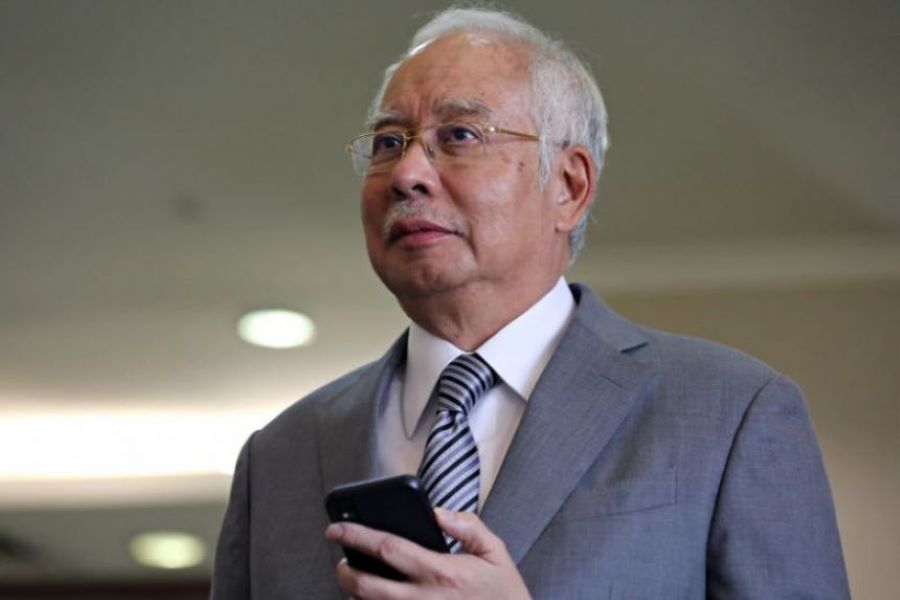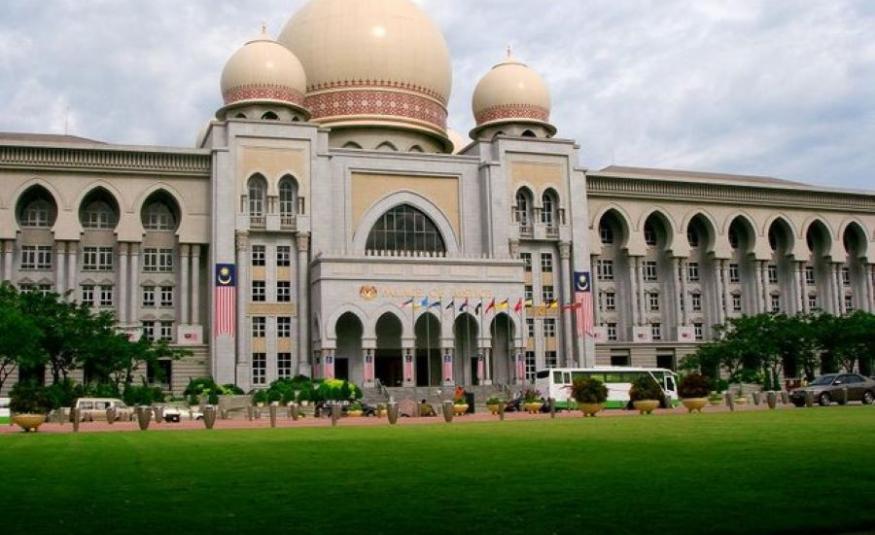KUALA LUMPUR 25 Ogos - Keputusan Mahkamah Persekutuan mengekalkan hukuman bersalah ke atas Mohd Najib Razak berikutan tiada sebarang dapatan yang menunjukkan Hakim Mahkamah Tinggi, Datuk Mohd Nazlan Mohd Ghazali terkhilaf dalam menilai semua keterangan yang dikemukakan berhubung pembelaan dan tidak mempercayai naratif pembelaan.
Mahkamah Persekutuan pada Selasa mengekalkan sabitan dan hukuman penjara ke atas Najib selama 12 tahun serta denda RM210 juta dalam kes penyelewengan dana SRC International bernilai RM42 juta.
Mahkamah Persekutuan juga mendapati tiada bukti baharu yang boleh menjejaskan dapatan Mahkamah Tinggi dan panel tiga orang hakim Mahkamah Rayuan.
Panel lima hakim Mahkamah Persekutuan yang dipengerusikan Ketua Hakim Negara, Tun Tengku Maimun Tuan Mat, menolak teras pembelaan Mohd Najib untuk mencabar elemen mens rea atau niat melakukan jenayah, iaitu beliau menafikan pengetahuan bahawa dana itu adalah daripada SRC.
Menurut Mahkamah Persekutuan mereka bersetuju dengan Pendakwaan dan Mahkamah Rayuan bahawa pihak pembelaan tidak wajar dipercayai kerana hujah yang bertentangan dan tidak dapat dibuktikan.
Perayu (Mohd Najib) menyatakan beliau tidak mengetahui wang RM42 juta tersebut namun dalam masa yang sama menegaskan bahawa beliau telah dianiaya dalam konspirasi yang oleh ahli perniagaan dalam buruan Low Taek Jho atau Jho Low, Allahyarham Datuk Azlin Alias (ketika itu setiausaha sulit utama Najib), Nik Faisal Ariff Kamil (bekas ketua pegawai eksekutif SRC), dan pegawai bank.
Perayu juga mempertahankan bahawa wang yang dikreditkan ke dalam akaun peribadi di bank AmIslamic yang menjadi subjek enam pertuduhan terakhir, adalah derma dari Arab Saudi yang bertentangan dengan dakwaan beliau menjadi mangsa konspirasi.

Mahkamah Persekutuan bersetuju bahawa Hakim Mahkamah Tinggi dan Panel Hakim Mahkamah Rayuan telah menyelidik dengan terperinci semua hujah pembelaan dan tidak menemui sebarang kekhilafan untuk menolak keputusan kedua-dua mahkamah tersebut.
“Dalam membuat kesimpulan bahawa pihak pembelaan gagal menimbulkan keraguan munasabah terhadap kes pendakwaan, kami mendapati Hakim Mahkamah Tinggi telah menjalankan analisis menyeluruh terhadap keterangan yang dikemukakan oleh pihak pembelaan. Oleh itu, kami tidak dapat membuat kesimpulan bahawa mana-mana dapatan Mahkamah Tinggi, seperti yang disahkan oleh Mahkamah Rayuan adalah jelas salah sehingga memerlukan campur tangan rayuan. Kami bersetuju bahawa pembelaan sememangnya tidak konsisten dan luar biasa sehingga tidak menimbulkan keraguan munasabah terhadap kes pendakwaan,” kata Tengku Maimun.
“Pendakwaraya berhujah mereka sentiasa mengekalkan dalam perbicaraan bahawa pembelaan sama sekali tidak konsisten dan bercanggah. Responden (Pendakwaraya) juga merujuk kepada bukti dokumen yang membuktikan perayu telah membelanjakan RM42 juta,” katanya.
Kedudukan Mahkamah Persekutuan adalah jelas iaitu mereka hanya menentukan sama ada Hakim Mahkamah Tinggi dan Mahkamah Rayuan telah membuat kesilapan dalam penghakiman.
Bertentangan dengan pandangan bahawa Mohd Najib tidak mendapat pembelaan sebenar berikutan keputusan peguam belanya, Hisyam Teh Poh Teik tidak berhujah, penghujahan sebenar di Mahkamah Persekutuan telah bermula berbulan lebih awal melalui pembelaan dan rayuan bertulis.

Mahkamah Persekutuan telah menerima lebih 90 halaman hujahan peguam bela Mohd Najib dan pendengaran di Mhakamah hanyalah tambahan kepada apa yang telah dihantar secara terperinci, Suara.tv melaporkan.
Apakah keputusan penting Mahkamah Rayuan yang disokong oleh Mahkamah Persekutuan?
Sebelum ini Mahkamah Rayuan telah menolak rayuan Mohd Najib atas 22 perkara (boleh baca di bawah artikel ini). Namun terdapat tiga perkara utama yang sangat relevan menolak pembelaan Mohd Najib.
Pertama bahawa wang tersebut adalah derma dari Arab Saudi. Mahkamah Rayuan dalam keputusannya menyatakan terdapat bukti jelas bahawa wang tersebut dari SRC International dan ini yang dinyatakan dalam perkara 14 penghakimannya:
(14) The trial judge was right when he held that the RM42 million belonged to SRC. The money trail recorded that the RM42 million originated from SRC’s AmIslamic Bank account and transited through the bank accounts of Gandingan Mentari Sdn Bhd (“GMSB”) and lhsan Perdana Sdn Bhd (“IPSB”) before being deposited into the appellant’s personal bank accounts.
Evidence had established that the flow of these funds through these intermediary companies was for the purposes of layering the transaction and disguising the flow of funds such that it would be more difficult to track the funds’ nexus to SRC and avoid detection by the authorities.
If such nefarious schemes of layering and camouflaging the flow of funds through multiple companies or individuals were to be construed to mean that the entity where the source of the funds had originated had lost its propriety interest in those funds, then those in [2022] 1 MLRA 359 Dato’ Sri Mohd Najib Hj Abd Razak v. PP control of these companies could easily misappropriate company funds and be beyond the reach of the law merely by layering the flow of funds. The courts could not countenance that. In cases such as the present where both GMSB and IPSB did not have any interest or lawful reason to receive the funds, then the law would always consider such funds to belong to SRC. (paras 214 & 216)
(Hakim bicara betul apabila beliau berpendapat bahawa RM42 juta itu adalah milik kepada SRC. Jejak wang itu merekodkan RM42 juta itu berasal daripada Akaun AmIslamic Bank SRC dan transit melalui akaun bank bagi Gandingan Mentari Sdn Bhd (“GMSB”) dan lhsan Perdana Sdn Bhd (“IPSB”) sebelum dimasukkan ke dalam akaun bank peribadi perayu.
Bukti telah menetapkan bahawa aliran dana ini melalui perantara ini syarikat adalah untuk tujuan melapisi transaksi dan menyamar aliran dana supaya lebih sukar untuk menjejaki perhubungan dana kepada SRC dan mengelakkan pengesanan oleh pihak berkuasa.)
Kedua bahawa Mohd Najib tidak mengetahui wang tersebut dari SRC dan beliau ditipu oleh Low Taek Jho (‘Jho Low’), Azlin Alias, Nik Faisal Ariff Kamil, dan pengurus bank.
Mahkamah Rayuan menolak hujahan ini kerana Mohd Najib sebagai Perdana Menteri dan pemilik akaun mempunyai masa, kedudukan dan kuasa untuk menyiasat dan menentukan kesahihan wang yang masuk ke dalam akaun peribadinya namun tidak mengambil sebarang tindakan ke arah itu.
(19) This court agreed with the trial judge that when the doctrine of wilful blindness was applied, the evidence overwhelmingly showed that the appellant as the account holder of the two accounts into which the RM42 million flowed, had not been vigilant or taken measures to ensure that the funds received in his account were not proceeds of any unlawful activity.
The appellant did not take any steps to investigate the flow of funds into his accounts. He seemed to have placed reliance on what Jho Low had told him as to the source of the funds and nothing else.
He was the sitting Prime Minister at the material time and he had every opportunity, including official government channels, to make enquiries and confirm if indeed the funds came from the Saudi monarch. Not a single step was taken by the appellant to ascertain or verify the truth of the source as intimated to him by Jho Low, allegedly. This was classic wilful blindness. (paras 367-368)
Ketiga, mengenai akaun tersebut digunakan untuk tujuan kebajikan, Mahkamah Rayuan juga mendapat pembelaan tersebut tidak tepat kerana terdapat bukti-bukti pembayaran lain bersifat peribadi dan politik.
(15) This court agreed with the trial judge that the element of misappropriation of entrusted property by the appellant had been established. The evidence showed that the appellant not only misappropriated RM42 million, the subject of the three criminal breach of trust charges, but also converted to his own use that which he had dishonestly misappropriated.
The RM42 million, contrary to the appellant’s assertion that he used it for corporate social responsibility (CSR) programs of the company, had in fact been used for his personal benefit and for his political purposes. The findings of dishonest intent on part of the appellant were also well supported by evidence. (paras 243 & 245)
Dalam mengetepikan rayuan terakhir Najib yang juga merupakan bekas perdana menteri, Ketua Hakim Negara berkata panel mendapati ‘rungutan’ perayu sebagaimana yang terkandung dalam petisyen rayuan tidak mempunyai merit.
“Kami mendapati sabitan semua tujuh pertuduhan terhadap perayu adalah selamat. Kami juga mendapati hukuman yang dijatuhkan adalah tidak keterlaluan. Sabitan serta hukuman dikekalkan,” katanya.
Terdahulu Tengku Maimun berkata dalam rayuan yang menyaksikan peguam hadir namun bertegas enggan membuat sebarang hujahan walaupun diminta berkali-kali oleh mahkamah untuk berbuat demikian, mahkamah mempunyai kuasa untuk meneruskan prosiding rayuan mengikut Seksyen 92 Akta Mahkamah Kehakiman 1964.
Katanya sehubungan itu mahkamah meneruskan prosiding, menimbang rayuan dengan mengambil kira rekod rayuan, termasuk petisyen rayuan yang menyenaraikan 96 alasan difailkan di Mahkamah Rayuan, serta penghakiman bertulis oleh Mahkamah Tinggi dan Mahkamah Rayuan.
“Kami tidak berpandangan perlunya menampilkan semula pertuduhan atau mengulangi sebarang fakta yang telah dinyatakan dengan secukupnya, dan menganalisis penghakiman Mahkamah Tinggi dan Mahkamah Rayuan.
“Hakim perbicaraan yang arif membuat analisis yang terperinci terhadap semua bukti, yakni segala bukti dokumen dan lisan yang dibentangkan di hadapannya dalam tempoh kira-kira 86 hari perbicaraan. Mahkamah Rayuan begitu teliti memeriksa semua penemuan ini dan mendapati tiada kesilapan yang boleh dirayu,” katanya.
Hakim Tengku Maimun berkata peranan mahkamah tertinggi itu sebagaimana yang ditetapkan undang-undang, bukanlah untuk membuat penemuan baharu berhubung fakta terhadap bukti yang direkodkan, atau menggantikan ia dengan penemuannya sendiri.
Pada 28 Julai 2020, Hakim Mahkamah Tinggi ketika itu Datuk Mohd Nazlan Mohd Ghazali yang kini hakim Mahkamah Rayuan, menjatuhkan hukuman penjara 10 tahun kepada Najib bagi setiap tiga pertuduhan pecah amanah jenayah (CBT) dan setiap tiga pertuduhan pengubahan wang haram, dan penjara 12 tahun serta denda RM210 juta (jika gagal bayar, penjara lima tahun) bagi tuduhan menyalahguna kedudukan.
Pada 8 Dis 2021, Mahkamah Rayuan mengekalkan keputusan Mahkamah Tinggi dan menolak rayuan Najib untuk mengetepikan sabitan dan hukuman penjara serta denda.
22 PERKARA YANG DIPUTUSKAN OLEH MAHKAMAH RAYUAN
(1) There was neither an attempt by the prosecution to adduce further evidence or rebuttal evidence during the defence case, nor was there any attempt by the prosecution to supplement or close any gap in their case by reference to the evidence adduced by the defence. The appellant’s main complaint that the trial judge in the final judgment did not keep to his oral summary of findings made and pronounced at the end of the prosecution case on the issue of prima facie case, was without merit. (para 77)
(2) There was no misdirection on the part of the trial judge on the assessment of the prima facie case. The trial judge had not supplemented or improved on the grounds in which the prima facie findings were made. The oral ruling was accompanied by a summary of the key findings, which by implication meant that the trial judge when ultimately writing his judgment would have a more comprehensive account of his reasoning and findings. The appellant had not been asked to answer matters beyond the findings in the oral ruling and the appellant’s constitutional right to a fair trial was not infringed. Further, the trial judge had applied the law correctly in making his evaluation of the prosecution case to determine if the prima facie threshold had been established for all the charges. (paras 88 & 90)
(3) The appellant was at the material time an officer of a public body within the meaning ascribed to it under s 3 of the MACC, by virtue of the fact that he was not only a member of the administration, but also a Member of Parliament, as well as a person receiving remuneration from public funds. Any one of these three positions would have already fulfilled the definition of an officer of a public body. (para 103) 356 [2022] 1 MLRA Dato’ Sri Mohd Najib Hj Abd Razak v. PP
(4) This court agreed entirely with the trial judge’s findings that the appellant’s active participation in the Cabinet decision making process to issue the two government guarantees and the final decision in that regard by the Cabinet to approve the two government guarantees, coupled with the glaring personal interest that the appellant had in those decisions, brought the appellant squarely within the ambit of the offence under s 23(1) of the MACCA. The fact that the appellant was subsequently shown to have used the funds of SRC for his personal benefit also went towards establishing his personal interest in the Cabinet decision to issue the two government guarantees, without which there would be no loans disbursed to SRC, and without which SRC would not have the kind of funds that were channelled into the appellant’s personal accounts. Hence, all factual requirements for the presumption under s 23(2) of the MACCA had been established and the appellant was presumed by law to have committed the offence of using his office for gratification under s 23(1). (para 111)
(5) The trial judge correctly opined that s 23(4) of the MACCA contemplates two public bodies. The accused in order to avail himself of this provision must be shown to be holding office in the first public body as a representative of another public body which is controlled by the first mentioned public body. The decision or action done by the accused as the representative must be for the advantage of the second public body. The appellant’s role in SRC was by virtue of his position as Prime Minister at the material time. He was granted special powers in the M&A of SRC because of his position in the Government. That could not be translated to the appellant being an officer of SRC. Nor could the appellant’s shareholder role in SRC, via MOF Inc., be construed to make the appellant an officer of SRC. The trial judge found that s 23(4) could not apply to the appellant as it had not been shown that the actions taken by the appellant which led to the Government’s decision to grant the two government guarantees in favour of Kumpulan Wang Persaraan (Diperbadankan) (“KWAP”) guaranteeing the loans granted to SRC, were done in the interest or to the advantage of the Government of Malaysia. (paras 114-115)
(6) Regarding the appellant’s contention of the need to prove immediate and direct nexus of the corrupt intention at the time of making decision or taking any action with the exact amount of RM42 million gratification, by the very wording and language of s 23(1) of the MACCA read together with s 23(2), the offence under s 23 of the MACCA (offence of using office or position for gratification) was complete once the accused took any decisions or actions in which the accused had an interest. The receipt of gratification was not an element of the offence and it was unnecessary for the prosecution to prove the same. (paras 121 & 123)
(7) The trial judge was right in holding that there was no requirement in law for the nature of the appellant’s interest in the decision to be stated in the charge. The interest element was not an integral part of the offence under s 23(1) of the MACCA, being an offending provision. In any event, under s 156 of the [2022] 1 MLRA 357 Dato’ Sri Mohd Najib Hj Abd Razak v. PP Criminal Procedure Code, no omission of particulars was material unless the accused was misled. Here, it could not be gainsaid that the appellant was prejudiced by any lack of particulars in the charge. (para 125)
(8) The appellant contended that the Ministry of Finance’s (“MOF”) had agreed to grant security for the KWAP loans, which according to the appellant negated the need for appellant’s intervention on the issuance of the government guarantees. However, there was no evidence to show that MOF had agreed in principle to provide security for the loans. In any event, pursuant to s 2(2) of the Loans Guarantee (Bodies Corporate) Act 1965, only the Cabinet could agree to provide any government guarantee, though the instrument itself may be signed by the Finance Minister. Here, there was no evidence of the Yang Dipertuan Agong of ever being informed of SRC’s default of the loans, or of the subsequent short-term loans issued by MOF totaling some RM650 million to service the interest on the loans. Evidence showed that only the first shortterm loan was brought to the Cabinet for approval, while the second and third short term loans were approved by the appellant himself. Hence, even the statutory protections that parliament had considered necessary to be in place to protect the Government’s financial interests were blatantly disregarded by the appellant. (para 126)
(9) The mention of the two Cabinet decisions in the single charge under s 23(1) of the MACC did not offend the rule against duplicity or misjoinder of charges. There was only one charge with a long time span as the transaction was a rather long one. (para 134)
(10) The appellant in his defence said that all his actions regarding SRC were for national interest and that he had no personal interest. However, the appellant was actively involved in ensuring that the KWAP loans were disbursed to SRC. Following the disbursement of the funds, the appellant became indifferent to the whereabout of the funds, and did not inquire from SRC as to what had happened to the funds, or how it was utilised and for what purpose. He even instructed the then second Finance Minister to keep off SRC. Once the funds had been secured by SRC, over which the appellant had overarching control, he was free to utilise them for his personal benefit. This was manifested by the flow of the RM42 million from SRC into his personal accounts. This was definitely not something that could be said to have been done in the national interest. (paras 135 & 141)
(11) The trial judge had correctly concluded that the concept of shadow director was embodied in the definition of “director” in s 402A of the Penal Code, particularly the 2nd limb thereof and that the appellant was indeed a shadow director of SRC. Apart from being an agent by virtue of being a director, the appellant would also be an agent by virtue of the non-exhaustive definition of agent in s 402A. This was said to arise from the appellant’s position as Prime Minister, Finance Minister and Advisor Emeritus of SRC. Thus, the 358 [2022] 1 MLRA Dato’ Sri Mohd Najib Hj Abd Razak v. PP appellant had the obligation to act in the best interests of the company and was subject to the same duties and obligations of a director under the law. (paras 172, 178 & 181)
(12) The appellant did not execute his role as MOF Inc, quo shareholder, when he had in actuality micro managed SRC. The normal company governance structure allowed for shareholders resolutions to regulate macro management affairs of the company and hence shareholders minutes were usually confined to the macro management aspect of the company’s affairs and did not descend to the level of dictating the day to day operations or micro-management matters, such as, where to open bank accounts, where to place the company funds, who the external auditors and solicitors should be. The appellant as MOF Inc, did not act within the scope of a shareholder’s representative, but interfered with the Board’s function and acted more like a shadow director, and by that as an agent within the wide meaning envisaged under s 402A of the Penal Code. The actions of the appellant was executed by wearing different hats as Prime Minister, Finance Minister, MOF Inc. and Advisor Emeritus, which entrenched his commanding position in SRC, which in turn enabled him to direct the SRC Board as its overall master. (para 185)
(13) This court agreed with the trial judge’s finding that the appellant’s assertions on the application of the law on entrustment under s 405 of the Penal Code were flawed. The entrustment of the property need not be exclusive as s 405 itself provided that entrustment could be made jointly. Therefore, the fact that the directors of SRC still retained their usual control of the company in the exercise of their statutory and fiduciary duties, did neither negate nor diminish the appellant’s joint and concurrent control over SRC. The concentrated and domineering powers of the appellant in SRC, which the appellant exercised to the fullest showed that the appellant was entrusted with dominion over the property of the company in tune with s 409 of the Penal Code, not directly but through the directors of the company, who were his puppets on a string. He had controlling authority over the company that was secured through the directors of the company who had direct control over the properties and funds of SRC. (paras 201 & 209)
(14) The trial judge was right when he held that the RM42 million belonged to SRC. The money trail recorded that the RM42 million originated from SRC’s AmIslamic Bank account and transited through the bank accounts of Gandingan Mentari Sdn Bhd (“GMSB”) and lhsan Perdana Sdn Bhd (“IPSB”) before being deposited into the appellant’s personal bank accounts. Evidence had established that the flow of these funds through these intermediary companies was for the purposes of layering the transaction and disguising the flow of funds such that it would be more difficult to track the funds’ nexus to SRC and avoid detection by the authorities. If such nefarious schemes of layering and camouflaging the flow of funds through multiple companies or individuals were to be construed to mean that the entity where the source of the funds had originated had lost its propriety interest in those funds, then those in [2022] 1 MLRA 359 Dato’ Sri Mohd Najib Hj Abd Razak v. PP control of these companies could easily misappropriate company funds and be beyond the reach of the law merely by layering the flow of funds. The courts could not countenance that. In cases such as the present where both GMSB and IPSB did not have any interest or lawful reason to receive the funds, then the law would always consider such funds to belong to SRC. (paras 214 & 216)
(15) This court agreed with the trial judge that the element of misappropriation of entrusted property by the appellant had been established. The evidence showed that the appellant not only misappropriated RM42 million, the subject of the three criminal breach of trust charges, but also converted to his own use that which he had dishonestly misappropriated. The RM42 million, contrary to the appellant’s assertion that he used it for corporate social responsibility (CSR) programs of the company, had in fact been used for his personal benefit and for his political purposes. The findings of dishonest intent on part of the appellant were also well supported by evidence. (paras 243 & 245)
(16) Despite overwhelming evidence, the appellant denied knowledge of the movement of the SRC funds into his accounts. The appellant claimed that he had assumed that the funds that came into his accounts were donations from the Saudi Royal family. In support of this, reference was made to some Arab letters which were purportedly written by one Prince Saud Abdulaziz Al-Saud on behalf of the King of Saudi Arabia. However, neither the maker was called nor the authenticity of these letters established at trial. The contents of the letters were inadmissible hearsay. (para 247)
(17) All elements of the three offences under s 4(1) of AMLATFPUA had been well established by the prosecution. The culpability of the appellant was based on the fact that he was knowingly concerned with the illegal proceeds from unlawful activities. The evidence showed that the appellant knew, or had reason to believe or had reasonable suspicion that the funds entering his personal bank accounts at AmIslamic Bank were proceeds of unlawful activities. In fact, the appellant had without any reasonable excuse failed to take steps to ascertain whether or not the funds were the proceeds of unlawful activities. (paras 273 & 278)
(18) The trial judge had given matured and detailed consideration to the issue of authenticity of the documents regarding the resolutions of the shareholder of SRC. This court agreed entirely with the ruling of the trial judge and the reasons for that ruling. There was no additional evidence adduced by the defence during its case that would warrant the trial court to reconsider the earlier ruling made during the prosecution case on the admissibility of these documents. (para 346)
(19) This court agreed with the trial judge that when the doctrine of wilful blindness was applied, the evidence overwhelmingly showed that the appellant as the account holder of the two accounts into which the RM42 million flowed, had not been vigilant or taken measures to ensure that the funds received in his account were not proceeds of any unlawful activity. The appellant did not take 360 [2022] 1 MLRA Dato’ Sri Mohd Najib Hj Abd Razak v. PP any steps to investigate the flow of funds into his accounts. He seemed to have placed reliance on what Jho Low had told him as to the source of the funds and nothing else. He was the sitting Prime Minister at the material time and he had every opportunity, including official government channels, to make enquiries and confirm if indeed the funds came from the Saudi monarch. Not a single step was taken by the appellant to ascertain or verify the truth of the source as intimated to him by Jho Low, allegedly. This was classic wilful blindness. (paras 367-368)
(20) This court found, as the trial judge did, that the prosecution had proved all the three money laundering charges under s 4(1)(b) of the AMLATFPUA beyond reasonable doubt. The appellant’s conviction on the three charges under s 4(1)(b) of AMLATFPUA was safe. (para 371)
(21) The appellant submitted that the appellant had a right to the statements of all those offered witnesses, who had provided statements to the MACC that the defence wanted to call. However, the Federal Court had as a matter of policy stated that such statements were privileged from disclosure. The reasons given by the trial judge for the dismissal of the appellant’s application were well grounded in law and were the correct position in law. (para 378)
(22) The trial judge did not err in the application of the sentencing principles or in appreciating the material facts placed before him. He had not made a wrong decision as to the proper factual basis for the sentencing. There was proper consideration by the trial judge of all factors that were relevant to be taken into consideration in sentencing. In the circumstances of the facts, this court did not find the sentences to be grossly excessive. The terms of imprisonment and fine imposed were wholly adequate and commensurate with the nature of the offences. (para 395) - DagangNews.com










